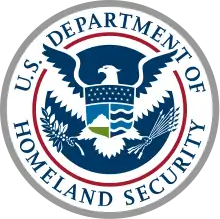National Cybersecurity Center
The National Cybersecurity Center (NCC)[1] was founded in 2016[2] as a 501(c)(3) nonprofit organization in Colorado Springs, Colorado. it was started from a vision of then Governor John Hickenlooper, in coordination with several people from the University of Colorado Colorado Springs (UCCS) and the community. The NCC serves both public and private organizations and individuals through training, education and research.[3] The NCC
| Agency overview | |
|---|---|
| Formed | March 2016 |
| Headquarters | Colorado Springs, Colorado United States |
| Website | cyber-center |
It is not to be confused with the National Cybersecurity and Communications Integration Center (NCCIC), an office within the United States Department of Homeland Security.
Leadership
Ed Rios was CEO of the NCC from October 2016 to 2018. Vance Brown was CEO from 2018 to 2020. In 2020, Harry D. Raduege, Jr., Lieutenant General, USAF (Ret.) became CEO.
Board members included Senator John Hickenlooper, Governor Jared Polis, Mayor John Suthers, and several retired US military officers.
- Kyle Hybl (Chairman of the Board)
- Andre McGregor (Vice Chairman of the Board)
- Harry Raduege (CEO and Board President)
- Forrest Senti (Board Secretary)
- Mayor John Suthers (Past Chairman)
- Ed Anderson
- Christian Anschutz
- Kathy Boe
- Rick Crandall
- Kim Crider[4]
- Honorable Karen S. Evans[5]
- Sen. John Hickenlooper
- Leslie Kershaw
- Gary McAlum
- Dawn Meyerriecks
- Erik Mitisek
- Governor Jared Polis
- Greg Oslan
- Chancellor Venkat Reddy
- Ed Rios
- Mark Weatherford
- Senior Vice Chancellor Martin Wood
- RADM Thomas E. Zelibor, Rear Admiral, USN (Ret.)[6]
Mission and Vision
Mission
The mission of the NCC is to "Support Colorado Springs and State-wide Cybersecurity and Space activities. Become a Nationally recognized leader in Cybersecurity education, workforce development, and public policy. Improve Nationwide trust, security, resilience, and prosperity."[7]
Vision
"Building Trust, Knowledge, & Security Throughout Cyberspace"[8]
Cyber Education
The National Cybersecurity Center provides cybersecurity leadership, with two main pillars: K-12 education with the NCC Student Alliance, and the Adult Education Initiative.[9]
Student Alliance
The NCCSA is a Cyber Education Student Organization that focuses on cybersecurity. The mission of the NCCSA is to respond to the urgent demand for trained cybersecurity talent while recognizing the importance of providing students with the knowledge, career, and academic pathway information in this exciting and critical field.

NCCSA is a school-based network of student-run chapters that provide learning, competing, leadership and soft-skills development, networking, skill-building, and social opportunities. It began as a grassroots effort of students, teachers, community college peers, and the NCC who collaborated with partners and stakeholders to organize a student organization that meets the needs of cyber-students across the country.
The NCC has host cyber camps, capture the flag and other events for the students to get hands on experience.
Adult Education
The NCC adult Education intuitive is designed to increase the number of cybersecurity professionals in the workforce and increase the number of underrepresented groups in the cybersecurity workforce.[10] The NCC offers both self guide and instructor-led classes.
Space Information Sharing and Analysis Center
On April 8, 2019, the NCC announced a partnership with Space ISAC. The Space ISAC is an Information Sharing and Analysis Center focused on space industry threats. Space ISAC collaborates across the global space industrial base to enhance the nation's ability to prepare for and respond to vulnerabilities, incidents, and threats. Space ISAC provides members with timely and actionable information and serves as the primary communications channel for the sector.[11]
Cybersecurity for State Leaders
In 2020, The National Cybersecurity Center introduced an initiative to train elected officials in state governments and their staff members on cyber hygiene and IT security.[12]
Cybersecurity for State Leaders (CfSL) is a program of the NCC, supported by Google. The program trained state legislatures on cybersecurity best practices through live, viral, on demand, and a text courses. The program aims to educate state lawmakers and staff on "ways to strengthen defenses against digital attacks".[13] A series of experts from all over the country including West Virginia U.S. Senator Joe Manchin, former DHS Cybersecurity Deputy Undersecretary Mark Weatherford, senior experts and researchers at Google, Microsoft, and IBM, Shark Tank’s Shark and cybersecurity guru Robert Herjavec, helped teach some of the top cyber tips.[14]
Colorado Cyber Resource Center
In 2021 the National Cybersecurity Center (NCC), announced the launch of the Colorado Cyber Resource Center (CCRC) to help Colorado’s local governments, school districts, special districts and critical infrastructure towards a more cyber-secure future.
The Colorado Cyber Resource Center is the shared product of the Colorado Whole of State Working Group and the NCC. Led by local jurisdictions and supporting state and federal agencies, the Whole of State Working Group has evolved over the past several years into an organized collaborative working towards rising the tide of cybersecurity in Colorado. Concerned with the needs of our least-resourced jurisdictions, the Working Group uses feedback from smaller jurisdictions as a starting point for developing cyber resources in Colorado.[15]
PISCES
The CCRC will soon serve as the hub for Colorado’s chapter of PISCES- an initiative that helps monitor network flows of smaller jurisdictions at no charge while allowing cybersecurity students to gain experience that translates into workforce talent. The Public Infrastructure Security Cyber Education System (PISCES) provides qualified students with curricula and supervised experiences to act as entry-level cyber analysts. Students analyze streaming data for small communities or municipalities who may otherwise not be able to obtain cybersecurity to the extent needed. Through PISCES, a reliable high-quality pipeline is being developed to address the shortage of cyber professionals ready for the workforce.
PISCES works with professors to develop a curriculum for students in cyber-related fields and to give those students controlled access to real data from communities and municipalities. Students learn and enhance their skills in detecting threats while providing information to the municipalities and communities to secure the threat and prevent future attacks.[16]
Cyber Range
In January, 2022 the Colorado Cyber Resource Center partnered with RangeForce to launch a statewide cyber range available to K-12 students and career-transitioning adults alike. [17]
See also
- National Cyber Security Alliance, which assists U.S. home users, small businesses and education
- National Cybersecurity Center of Excellence, which assists businesses
- NH-ISAC, in healthcare
- National Cyber Security Centre (disambiguation)
- National Cybersecurity Center - YouTube
References
- mtomasetti. "Home". National Cybersecurity Center. Retrieved 2021-07-09.
- "National Cybersecurity Center Opens in Colorado". GovTech. 2018-01-22. Retrieved 2021-07-09.
- "About Us". National Cybersecurity Center. Retrieved 2022-03-15.
- "Former Military Tech Official Kim Crider to Lead AI Innovation at Deloitte". GovCon Wire. 2022-01-21. Retrieved 2022-03-15.
- Gazette, The. "Colorado Springs Movers & Shakers". Colorado Springs Gazette. Retrieved 2022-03-15.
- "Leadership". National Cybersecurity Center. Retrieved 2022-03-07.
- "About Us". National Cybersecurity Center. Retrieved 2022-03-15.
- "About Us". National Cybersecurity Center. Retrieved 2022-03-15.
- "Cyber Education". National Cybersecurity Center. Retrieved 2022-03-15.
- "Adult Education Initiative". National Cybersecurity Center. Retrieved 2022-03-15.
- "Space industry group focused on cybersecurity to begin operations in spring 2020". SpaceNews. 2020-01-23. Retrieved 2021-05-05.
- "Think tank launches cybersecurity training for state officials". StateScoop. 2021-03-29. Retrieved 2021-07-09.
- "About". Cybersecurity for State Leaders. Retrieved 2022-03-08.
- "Learn from the Experts". Cybersecurity for State Leaders. Retrieved 2022-03-08.
- "About". Colorado-CRC. Retrieved 2022-03-16.
- "PISCES". Colorado-CRC. Retrieved 2022-03-16.
- "CO Cyber Range". Colorado-CRC. Retrieved 2022-03-16.
